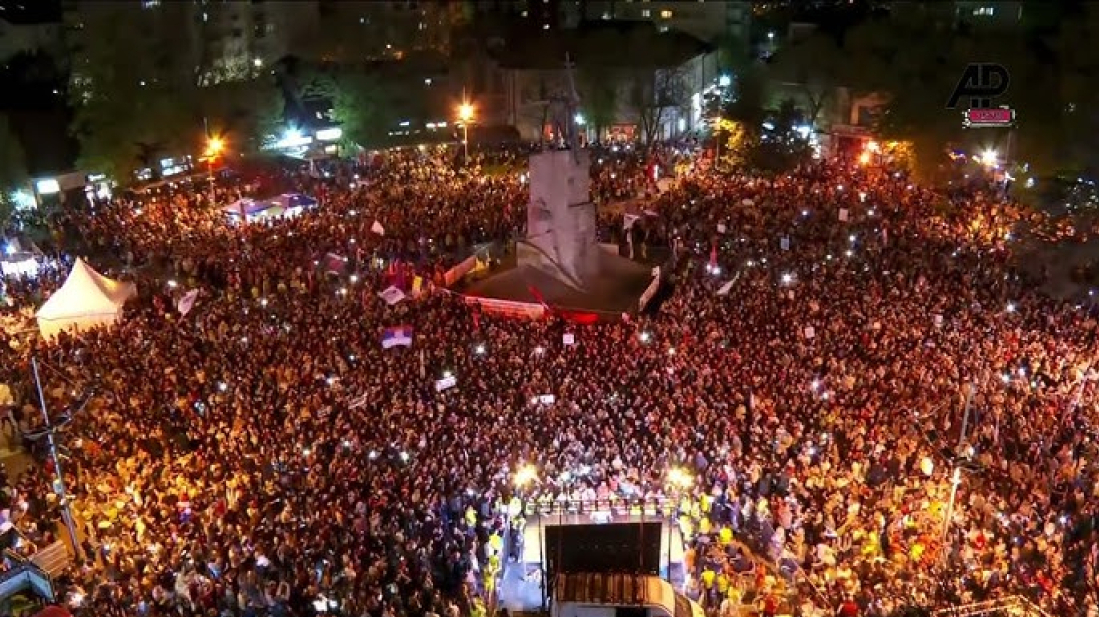live Israeli military says it has launched fresh strikes on Tehran: All the latest news on the Iran strikes
The Israeli military has begun a new wave of strikes on Tehran, it said late on Monday. The strikes came after it issued...

Serbian Ex-Minister of Trade and Construction has been arrested as part of an investigation into alleged corruption linked to a railway modernization project, including the renovation of Novi Sad railway station that was a key site of deadly disaster triggered mass protests in the country.
Serbia’s Special Prosecutor’s Office for Organized Crime has ordered the arrest of Tomislav Momirović and five other suspects in connection with the reconstruction of a railway station whose roof collapsed last November, killing 16 people and a mass protest movement that has shaken the Serbian government. One more seriously injured person is still in hospital.
The Special Prosecutor’s Office stated that the arrests were the result of efforts by the Task Force investigating financial flows related to the project “Modernization and Reconstruction of the Hungarian-Serbian Railway Line on the Novi Sad–Subotica–State Border (Kelebija) route.”
It also added that former Construction, Transport and Infrastructure Minister Goran Vesic and four more people are under investigation.
Momirovic resigned as Trade Minister on November 20, 2024. He was Construction, Transport and Infrastructure Minister from 2020 until 2022, during the time when Novi Sad railway station was reconstructed and then reopened in time for the 2022 elections.
The six are suspected of allegedly inflating invoices from a consortium of the two Chinese companies - China Railway International Co and China Communications Construction Co - who were given the task of reconstructing both the railway station at Novi Sad and tracks, the statement said.
They are suspected of damaging the state budget by $115.6 million, the statement said, and also said that by inflating invoices the Chinese consortium benefited by $18.8 million, but gave no further details.
In December 11 people, including Momirovic's successor Goran Vesic, were detained on suspicion of committing a criminal act against public safety.
Months of protests across Serbia following the roof collapse, including university shutdowns, have rattled the rule of President Aleksandar Vucic, a former ultranationalist who converted to the cause of European Union membership in 2008.
The protesters, who blame corruption for the disaster, demand early elections that they hope would remove Vucic and his party from power after 13 years.
They accuse Vucic and his allies of ties to organised crime, violence against rivals and curbing media freedoms. Vucic denies the accusations.
Follow the latest developments and global reaction after the U.S. and Israel launched “major combat operations” in Iran, prompting retaliation from Tehran.
Saudi Arabia’s state oil giant Saudi Aramco closed its Ras Tanura refinery on Monday following an Iranian drone strike, an industry source told Reuters as Tehran retaliated across the Gulf after a U.S.-Israeli attack on Iranian targets over the weekend.
The Kremlin is utilising the recent United States and Israeli military strikes on Iran to validate its ongoing war in Ukraine. Russian officials are pointing to the escalation in the Middle East as evidence that Western nations do not adhere to international rules.
The Middle East crisis intensifies after the deadly attack on the compound of the Supreme Leader of Iran Ali Khamenei on Saturday that killed him, other family members and senior figures. Iran has launched retaliatory strikes on U.S. targets in the region.
Ayatollah Alireza Arafi has moved into a pivotal constitutional role following the death of Supreme Leader Ayatollah Ali Khamenei, becoming the clerical member of Iran’s temporary leadership council under Article 111 of the Constitution of the Islamic Republic of Iran.
Former U.S. President Bill Clinton told lawmakers that President Donald Trump told him he had "some great times" with convicted sex offender Jeffrey Epstein before their relationship soured, according to a video released on Monday (2 March).
The U.S.-Iran crisis has entered its third day, with further strikes reported across the Middle East and the death toll rising. Oil prices have surged to levels last seen during the Covid-19 pandemic, raising fears of economic disruption and higher prices worldwide.
The UK said it's allowing the U.S. to use its bases for defensive strikes against Iran amid escalating missile attacks, after a suspected drone strike hit a British airbase in southern Cyprus, causing limited damage.
The Kremlin is utilising the recent United States and Israeli military strikes on Iran to validate its ongoing war in Ukraine. Russian officials are pointing to the escalation in the Middle East as evidence that Western nations do not adhere to international rules.
European Union stands with its member states in the face of any threat, EU Commission President Ursula von der Leyen said in response to the drone strike that hit Britain's Royal Air Force base of Akrotiri in southern Cyprus overnight.
You can download the AnewZ application from Play Store and the App Store.

What is your opinion on this topic?
Leave the first comment